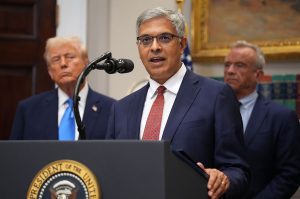Laramie, Wyoming
Americans are infamous on the eastern side of the Atlantic for knowing little or nothing about European culture, history and politics – and for being proud of the fact, as Richard Hofstadter, the late Columbia historian, described in them in Anti-intellectualism in American Life, the winner of the Pulitzer Prize for non-fiction in 1964.
Much less widely recognized is how little Europeans know about America, Americans and their own civilization – an ignorance that troubles them not at all, perhaps because they seem to be unaware of the fact.
A recent example of this self-assured want of knowledge is “the Editorial” last February 22 in the center-right Italian newspaper Il Messaggero; a daily feature printed on the left-hand side of the front page and written by various authors representing to a greater or lesser degree the Italian establishment. This particular essay, Il Nuovo Manifesto degli Autocrati, is by Romano Prodi, twice prime minister of Italy, a former president of the European Commission and the founder of the Italian center-left.
“Since Donald Trump installed himself in the White House a month ago,” Prodi begins, “every day we have learned something new and almost never pleasing. We find ourselves in fact facing a real and proper revolution in the democratic rules governing the country that for many long decades was the reference point for world democracy. In Trump’s America it seems that no limits to his power exist in principle, as it proceeds to deny the fundamentals of its own Constitution, imitating, in impressive progression, the behavior of authoritative regimes.”
It appears, Prodi thinks, that the Constitution has been entrusted by the voters to the President to maltreat as he pleases. Under Trump, he claims, the balance of powers (“the very symbol of American democracy”) within the federal government has been destroyed, and so have “the prerogatives of public administration… while the Senate and the House rules are daily humiliated.”
Whether or not Signor Prodi has read the US Constitution, he has obviously not been following – not, at least, in an informed manner – the debates in the American press and in Congress regarding the constitutional issues raised by the new President’s 100 or so executive actions taken in the months since his second inauguration; those especially having to do with the powers granted by the Constitution to the chief executive, to whom the federal administrative agencies are constitutionally accountable.
Prodi charges Trump with having broken the rules of international diplomacy by threatening the sovereignty of Canada, Greenland and Panama (in the case of the first two countries he has, of course, no power whatsoever); with allowing his Vice President to refuse a meeting with the new Chancellor-apparent of Germany while supporting “the party of the extreme right” (which is also, as it happens, the party of the extreme left), behavior which, at worst, is merely a breach of protocol; with withdrawing the United States from the World Health Organization and the Paris Climate Treaty in accordance with his Constitutional prerogative; with seeking “political revolution” by imposing tariffs on foreign goods entering the United States (ditto); and with launching “a global attack against the rules of democracy and international solidarity” (rules which, in fact, are merely figments of the liberal imagination asserted by liberal governments, NGOs and lawyers); with a “radical change of engagement” with Europe and with citing the Old Continent as a “symbol” of inefficiency and moral corruption.
None of these actions is in any sense “authoritarian,” while most are ones Trump was popularly elected in a free and fair election to take. As for the President’s bluster about seizing Greenland and annexing Canada, nobody takes it seriously – including the President himself – whatever may be the purpose behind it.
Prodi admits that Europe’s response to Trump’s perceived affronts has been “tragically inappropriate” – what he really means is “pathetic” – without saying how, since to do so would be to concede that the European Union is internationally even more powerless in the military sense than it is in the political one.
Prodi’s column amounts to the bellow of an outraged and frustrated former Poohbah-in-Chief who knows that his power is limited to devising rules and regulations and getting them adopted in Brussels and circulated among the national bureaucracies of the union’s member states, which are growing increasingly rebellious under the inky thumb of the EU.
For years, Britons have resigned themselves to having to listen to outrageous (however, on occasion, amusing) statements and opinions issuing from Stephen Fry, the actor, on all sorts of subjects about which he apparently knows little, if anything – unlike the famous literary character with whom his name is associated nearly as closely as that of Reginald Jeeves’s brilliant creator. “It’s only Stephen Fry” has become the popular reaction to these eruptions. Similarly, “It’s only the European Union” is the sensible response to Prodi’s editorial, and other unwelcome communications issuing from members of the Brussels sodality.
This article was originally published in The Spectator’s May 2025 World edition.


























Leave a Reply